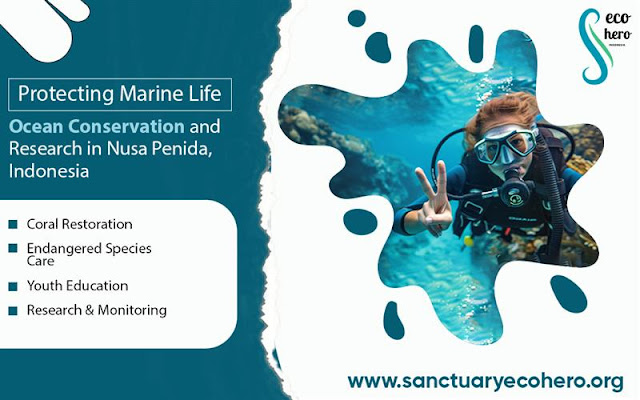Protecting Marine Life: Ocean Conservation and Research in Nusa Penida, Indonesia
Maintaining biodiversity, maintaining the climate, and allowing people to make a living
depend on the condition of the oceans worldwide. Threatening marine environments are
pollution, overfishing, and climate change. More and more people have now come to know
of these problems. Dealing with these issues calls for a lot of effort on scientific research
and environmental preservation.
Research-Driven Marine Protection
Protection that works depends highly on accurate scientific data. By use of field surveys,
monitoring coral reef health, and species population recording, researchers can make wise
decisions regarding the optimum management of marine environments. The marine
research Nusa Penida is quite vital for enabling local and surrounding residents to learn
more about the changes in the surroundings.
Research studies sometimes survey reef structures, assess water quality, and investigate the
behaviour of significant marine life such manta ray and reef sharks. These initiatives help
identify regions requiring quick assistance and guide the establishment of marine protected
areas. Long-term observation lets experts monitor throughout time the success of
environmental projects.
Research-Driven Marine Protection
Sustainable practices and community involvement among the local population support
marine preservation initiatives to be most successful. Reducing the damage to the
surroundings will depend on teaching locals, fishers, and tourism businesses about
sustainable living. Part of a more complete approach to protect the surroundings are
encouragement of ethical fishing, cut of plastic use, and environmentally friendly transport.
The fusion of traditional knowledge and scientific study is one of the major
accomplishments of Ocean Conservation Indonesia. Often, people in the area have a lot of
knowledge about the marine environment. Using this knowledge to help with conservation
efforts is more successful and shows respect for other cultures. Conservation becomes a
goal that everyone supports when there are efforts to raise awareness and training
programs.
Marine Protected Areas and Policy Development
Establishing marine protected zones (MPAs) is among the best means of preserving
undersea life. These well-defined regions let marine life repair and flourish while deterring
activities damaging to it. Apart from their designation, MPAs must be implemented and
supported by the community to be successful.
Policymakers base their decisions on marine research Nusa Penida to strike a compromise
between long-term development and environmental needs. Changing dangers calls for
adaptive management techniques to safeguard the environment throughout time.
Community education and enforcement methods are very important for keeping
conservation zones in good shape.
The Future of Ocean Conservation
Small-scale conservation initiatives are growing in relevance as climate change alters regions
all around the planet. Field-based conservation efforts and scientific study will always assist
to establish plans of action for protection of marine life. By means of targeted initiatives and
continuous cooperation, Ocean Conservation Indonesia is gradually developing a model
that strikes a balance between environmental preservation and income generating.
Protecting the ocean is something to do long-term rather than once. Protecting reefs,
studying species, and enforcing rules all help to maintain marine life for the next
generations and hence assist the worldwide goal. Wet locations are among the most often
visited and varied ones on Earth.
Conclusion
The health of the planet depends much on marine ecosystems, which must thus be
preserved by a coordinated effort grounded on science, community, and policy. With
persistent effort, these initiatives will let marine environments remain strong, healthy, and
alive. Be the change for nature with Sanctuary Eco Hero – empowering everyday actions for
a greener, wilder planet.




Comments
Post a Comment